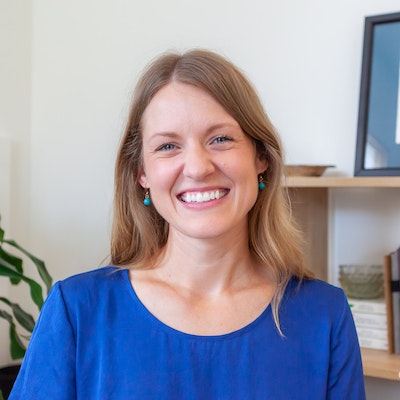You are here
Alumni Profile: School of Social Work Alum Jessica Irving-Marin (SSW ’15)

When the COVID-19 pandemic first shut down New Orleans schools in March 2020, it felt to Jessica Irving-Marin (SSW ’15) like she was back in school herself.
Specifically, a course in disaster mental health at the Tulane School of Social Work that put students through real-world disaster simulation exercises. “I remember the first few days of the shutdown from the pandemic and kind of feeling like I was back in that class, getting my team together and getting into crisis response mode, amping up communication, figuring out what our short-term response plan was going to be so that we could then take a longer view.”
Through February, Irving-Marin worked full time at the Youth Empowerment Project (YEP) as the director of YEP Educates. YEP Educates is an adult education program that helps youth aged 16 and older obtain their high-school credentials.
Now, she is a solo practitioner in individual therapy. The tagline for her practice is “Therapy for Helpers.”
Irving-Marin had noticed that the compassionate people who are drawn to careers where they help others, such as social workers, therapists, educators and healers, are becoming “overwhelmed - not just by the weight of their own experiences, but through regular exposure to the difficult experiences of other people.
The tagline for her practice is “Therapy for Helpers.”
Irving-Marin had noticed that the compassionate people who are drawn to careers where they help others, such as social workers, therapists, educators and healers, are becoming “overwhelmed - not just by the weight of their own experiences, but through regular exposure to the difficult experiences of other people.
“Being in a field of work that has no end point, where there’s no point at which the need is fully met, people can get into this pattern of override — ignoring all the signs that they need to take better care of themselves. When people continually give of themselves without boundaries, they become one of the resources that gets used up, especially in fields that are historically undervalued and under-resourced like education, nonprofits and nursing.”
That’s the space where Irving-Marin hopes to find her niche: “helping people find a way of relating to themselves and others that is more sustainable and more fulfilling, by shining light on and creating the structure to take care of their own needs.”
She acknowledged her worry that by going into practice for herself, instead of being surrounded by colleagues, she would lose her sense of professional community. “I remember thinking that other than my own therapist, I don’t really know any therapists,” she says. In her quest to find that community, Irving-Marin joined the Tulane School of Social Work Alumni Association and became a member of the board.
“If you can take care of your needs first, your well is much deeper and you have more to give others.
She has thrown herself into the strong Tulane alumni network, paying it forward to aid future generations. As a member of the alumni board, she is helping to create a pipeline for social work graduates to get connected with clinical supervisors and to create mentor opportunities for current students and recent graduates.
And it was Irving-Marin’s experience giving back to Tulane, by working as a field supervisor for Tulane Social Work interns, that helped prompt her career change into individual therapy.
“Working with social work students is another reason that I want to do what I’m doing now,” Irving-Marin says. “I want to help social workers, therapists and healers that are earlier in their careers, to rewrite some of the default scripts about what it means to be in helping work and to start to question what it means to be compassionate for a living. That it doesn’t mean that you have to give yourself away, and that actually, if you can take care of your needs first, your well is much deeper and you have more to give others.”
In her work to help individuals heal from the trauma and emotional stress that can keep this pattern in place, Irving-Marin uses therapies including EMDR (Eye Movement Desensitization and Reprocessing), a psychotherapy that enables people to heal from the symptoms and emotional distress that are the result of disturbing life experiences.
Irving-Marin plans to grow Therapy for Helpers to offer group therapy, continuing education and clinical supervision for social workers.